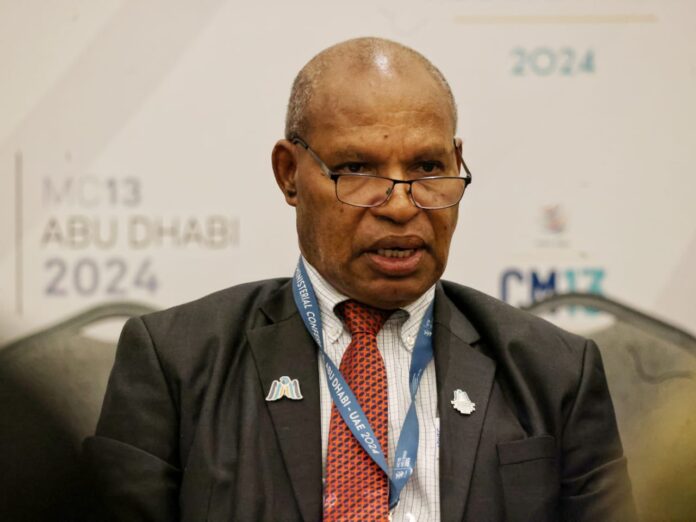Abu Dhabi, February 28, 2024- The Minister for International Trade and Investment, Hon. Richard Maru in his statement to the World Trade Organization (WTO) on the Fisheries Subsidies Agreement which had been discussed for many years said the Pacific Region had every reason to be concerned about the future of the fisheries industry because 50 per cent of the world’s tuna supplied by the Pacific Island States, with PNG accounting for 10 percent of the world’s supply.
“For the Pacific, we are concerned about overcapacity and overfishing because of the harmful effects that it will have in depleting all our fisheries resources, hence we cannot allow anyone to destroy the industry. The Fisheries Subsidies Agreement must safeguard the interest of the Pacific Region not only because we own and supply 50 per cent of the world’s tuna but because most of our island countries’ only renewable and sustainable resource is their fisheries resources. We cannot continue to allow a fisheries regime where few distant water fishing nations continue to exploit our resources in an unsustainable manner by proving subsidies that result in overcapacity and overfishing. Destroying our fisheries means destroying the lives of our people, destroying our current and future generations, destroying our economies, and destroying our livelihood. We will ratify the Agreement only when we are happy with the text because it is our responsibility as the custodians of the healthy fishing stocks on earth to make sure that it is responsibly harvested so that the world will continue to have fish supplies now and into the future,” said Minister Maru to set the context of his statement yesterday at the WTO 13th Ministerial Conference (MC13) in Abu Dhabi, United Arab Emirates.
Minister Maru fully supported the statements made by Fiji and Samoa who spoke on behalf of the Pacific ACP Member States and also thanked Australia, India, Bangladesh and the African nations for strongly supporting the position of the Pacific Island States and for their appeal to the WTO to hear the plight of the Pacific Island nations.
“For us the bottom line is this: Papua New Guinea and all our Pacific Island States continue to demand that the Additional Provisions must include a standstill and a rollback for the top subsidizers which mirrors the commitment we have all made in Sustainable Development Goal (SDG) 14.6. In W10 this would be a new A.1.1(d). Without a standstill and rollback for the Tier 1 members, the negotiations will be a failure,” said Minister Maru.
Minister Maru further stated: “We appreciate the negotiations, however, there are several pertinent issues that I wish to raise regarding disciplines to Overcapacity and Overfishing in Article A, Special and Differential Treatment in Article B and Transparency and Notification in Article C. If we are to deliver on SDG 14.6, we need a pragmatic, concise and credible agreement that will eliminate certain forms of subsidies that contribute to Overcapacity and Overfishing. The most harmful subsidies are the ones that keep distant water fleets at sea. Yet we see the watering-down of the text to reflect a select few distant water fishing interests. Firstly, Article A.1 does nothing to reduce the level subsidies. It requires measures that aim for sustainability, but it does not require actual sustainability. A proposed text for a standstill and rollback has been submitted to the Secretariat. These would require minor amendments to C.4 and C.5 to add the base year of 2023. A.2 is currently the only article that addresses the economic harm of subsidies. It needs to survive. Without it, the Pacific is being punished for having the sole remaining sustainable tuna fishery. Distant water interests are being subsidised to exploit our waters. Footnote 16 is also essential to clarify the meaning of A.2. Secondly, Article B – there is still an imbalance between effective disciplines on subsidies contributing to overcapacity and overfishing on one hand, and appropriate and effective special and differential treatment on the other hand because it does not take into account our special and unique circumstances – it does not meet our interests on small scale fisheries with no clear definition to demonstrate its characteristic and features to be fishing more or less that its contribution to OCOF is unjustifiable; it falls short on the mandate to accord appropriate and effective SDT principle. This Agreement must not prevent Small Island Developing state members from using subsidies to develop its fishing fleet. This includes exemption on disclosure of pricing of fishing access through allocation of licences, fishing rights or quotas which are important fisheries management tools. In doing so, we strongly view larger subsidizers should be excluded from B.5. In relation to Article C, we continue to propose the deletion of paragraph (iii). I conclude by reaffirming Papua New Guinea’s commitment to reaching an outcome in the fisheries subsidies negotiations so we can have an agreement.”


